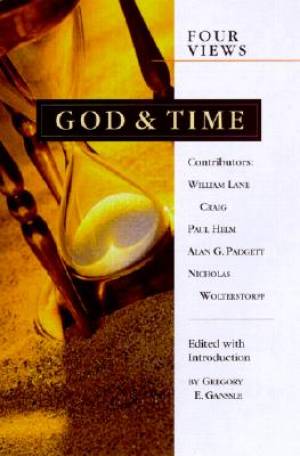Ganssle, Gregory E., ed. God & Time: Four Views. Downers Grove: IVP Academic, 2001. $24.00. 247 pages. Contributors: Paul Helm, Alan G. Padgett, William Lane Craig, and Nicholas Wolterstorff.
Of the issues in theology, God’s relationship to time has become one of the most complex. How does God relate to time? This question is coupled with two theories of time. A-theory (or the process theory) holds that time moves from one point to another in a unidirectional line. The B-theory of time (or the stasis theory) holds that time essentially stands still. B-theorists holds that the process of time is an allusion and time itself is rather static, or unmovable. I readily admit that I have had the book God & Time: Four Views on my shelf for quite some time and have anticipated the time when I could read it as this topic has become interesting to me. Recently, I was able to accomplish that task. Gregory Ganssle edits the book God & Time: Four Views. (Note: it is essential that the reader reads through Ganssle’s introduction. Ganssle provides a necessary background for the complex issues that lie ahead.) The book has four contributors, all holding different perspectives about how God relates to time.
First, Paul Helm (J. I. Packer Professor of Theology at Regent College, Vancouver, B.C.) argues for the divine timeless eternity view. That is, God is absolutely timeless and exists beyond the scope of space-time. Helm holds a version of the B-theory of time, although it could be said that there is a combination of A-theory and B-theory in his viewpoint. While Helm offers one of the most traditional views (and perhaps most biblical), Helm seems to one one hand argue that the universe is co-eternal with God, while on the other hand holding that the universe is a special creation of God coming into existence at a particular point. Elements of Helm’s argument were quite persuasive. However, I was left somewhat confused and bewildered at his explanation. It seemed that Helm argued for a beginningless, beginning for all of creation as Helm did not seem to hold to creation ex nihilo, which is quite odd.
Next, Alan G. Padgett (Professor of Systematic Theology, Luther Seminary, St. Paul, MN.) argues for the relative timelessness view. Padgett holds the A-theory of time. He argues that God is timeless and remains timeless despite creation. God, thus, operates in a sequence of events in eternity. Yet, God operates in time taking part of the sequential aspect of space-time. Overall, Padgett offered a compelling argument. I was left, however, unsatisfied with his argument of divine foreknowledge. Padgett argues that God knows the future. But since the future has not happened, it seemed that Padgett accepted some limitation in divine foreknowledge. (Note: I may have misunderstood Padgett in this regard.)
William Lane Craig (Research Professor, Talbot School of Theology, Biola University, La Mirada, CA) holds what is called timelessness and omnitemporality view. William Lane Craig, one of the greatest Christian philosophers and apologists of our time, holds the view that God was timeless before creation began, but then became temporal (in time) when creation came into being. I was not surprised by Craig’s argument. I previously read Craig’s work Time and Eternity: Exploring God’s Relationship to Time. My major qualm with Craig’s view is that the theologian is left accepting divine immanence without transcendence. Christian theologians have accepted for the vast majority of church history the duality of God’s transcendence and immanence. In fact, theism tends to rest upon such understanding. God is not time. God is not creation. God is outside the realm of both. Plus, since God created time, this view seems to limit God by the scope of His creation, something problematic when it comes to divine omniscience and omnipotence. Therefore, while I greatly respect William Lane Craig and his work, I hold reservations with his views pertaining to God and time.
Finally, Nicholas Wolterstorff (Noah Porter Professor of Philosophy, Yale Divinity School, New Haven, CT) argues the unqualified divine temporality view. Wolterstorff holds that God has always been temporal, acting in time. While God is everlasting, God acts in a sequential mode. Creation takes part in that sequence of time. However, many physicists accept that time is a created thing, coming into being when the universe first started. Of all the views presented, I was least satisfied with Wolterstorff’s view.
I had waited for some time to read this book. Unfortunately, I was left largely dissatisfied. Some contributors were far better than others. It’s interesting that Thomas Aquinas was used to prove nearly all of the four viewpoints. From my reading of Aquinas, I feel he would accept Helm and Padgett’s viewpoints more than any other. Nevertheless, this reader was left wondering if there could not be a fifth view. It seems that one could posit a view where God is outside the scope of time and able to see all points of created space-time (like Helm’s argument), but operated in a sequential modus operandi (as found in Padgett’s viewpoint), and related to creation (as found in Craig and Wolterstorff’s cases). While some views seemed more reasonable than others, none seemed to capture the classic theological viewpoint that I had hoped for.
I give this book three out of four stars. I think the book is an important work. One will find, though, that the book is not an easy read. Those who have not had exposure to philosophy and the God and time debate will struggle with this read. I would suggest reading up on the issues of God and time before engaging this work. Be sure to thoroughly read Ganssle’s introduction also as it will help immensely.





Copyright, September 10, 2016. Brian Chilton.





